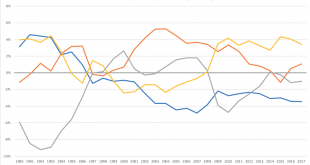An essential but perhaps overlooked way of looking at the economy is a sector financial balance approach. Pioneered by the late UK economist Wynne Godley, this approach starts with National Accounts data (called Financial Flow Accounts) for four broad sectors of the economy: households, corporations, government and non-residents. Here’s how it works: in any given quarter or year each sector can be a net borrower or lender, but the sum of the four sectors’ borrowing/lending must equal to...
Read More »Lars P. Syll — From Wicksell to Le Bourva and MMT
Some history of economics in light of economic history. The basis of MMT in accounting and balance sheets is not new, not is its operational approach to money. What is new is that those writing previous to the collapse of Bretton Woods when Nixon shut the gold window for settlement of international trade were dealing not dealing with the current monetary system. FDR had taken the dollar off gold decades earlier. MMT is an upgrade to previous thinking that is based on the new...
Read More »Rethinking the economics of extreme events
Review of Worst-Case Economics: Extreme Events in Climate and Finance by Frank Ackerman *** Long ago economics was termed “the dismal science,” but in recent years that title has arguably been passed on to climate science, with its regular and dire warnings that humanity needs to rapidly transition off of its use of fossil fuels for energy. In the face of such calls to action, progress has been frustratingly slow. The 2015 Paris Agreement offers some hope, as does the small-but-growing share...
Read More »Neil Wilson — The UK’s Unofficial Job Guarantee
How it worked, why it failed and how MMT Job Guarantee proposals avoid those problems Modern Money MattersThe UK’s Unofficial Job GuaranteeNeil Wilson
Read More »Michael Hudson — Origins of Money and Interest: Palatial Credit, not Barter
Neolithic and Bronze Age economies operated mainly on credit. Because of the time gap between planting and harvesting, few payments were made at the time of purchase. When Babylonians went to the local alehouse, they did not pay by carrying grain around in their pockets. They ran up a tab to be settled at harvest time on the threshing floor. The ale women who ran these “pubs” would then pay most of this grain to the palace for consignments advanced to them during the crop year. These...
Read More »Jason Smith — Sustained growth?
Something to think about.Information Transfer EconomicsSustained growth? Jason Smith
Read More »Jason Smith — It’s the 80s!
Interesting look at the history.Information Transfer EconomicsIt's the 80s!Jason Smith
Read More »Michael Hudson – Charles Goodhart — Could/Should Jubilee Debt Cancellations be Reintroduced Today?
Michael Hudson and Charles Goodhart team up. Longish and detailed but an easy read.CounterpunchCould/Should Jubilee Debt Cancellations be Reintroduced Today? Michael Hudson – Charles Goodhartalso Irrespective of what we may think of Syria, this is little but a full-scale assault on international law and the normative system embedded in the UN Charter that has taken decades of hard work to build, a fundamental cornerstone of the management and civilizational development of the world order...
Read More »Oscar Jorda — The rate of return on everything
Important. The rate of return on capital plays a pivotal role in shaping current macroeconomic debates. This column presents findings from a new dataset covering returns of major asset classes in the advanced economies over the last 150 years. The data offer new insights on several long-standing puzzles in economics, and uncover new relationships that seem at odds with some fundamental economic tenets. VOX - CEPR's Policy Portal The rate of return on everything Òscar Jordà, Katharina...
Read More »How Polanyi best explains Trump, Brexit and the over-reach of economic liberalism
Image via Wikipedia - fascists attack police, February 1934, Paris It’s good to see the latest (21 December) New York Review of Books give space to a review – by Robert Kuttner of American Prospect– of a biography of "Karl Polanyi: a Life on the Left" by Gareth Dale. For as we have been arguing for a...
Read More » Heterodox
Heterodox


